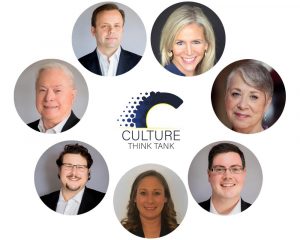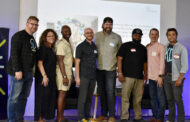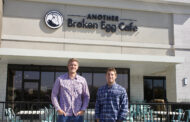Editor’s note: The following story — a spotlight on a member of the Plexpod community — is sponsored by Plexpod, a progressive coworking platform offering next generation workspace for entrepreneurs, startups, and growth-stage companies of all sizes.
Measuring the unmeasurable is Culture Think Tank’s specialty when it comes to company culture, said William Lindstrom.
“With the power of analytics, you can take years of research and data, and you can normalize it down to a few questions. Then all of a sudden, these few questions let you discover a lot of things — but simply,” said Lindstrom, who co-founded Thought Leadership League (doing business as Culture Think Tank) in 2015 with Delise Simmons, Rob Neilsen and Jim Courntey.
Culture Think Tank utilizes Tableau Software, Einstein Discovery, and surveys to analyze thousands of data points on performance analytics, well-being and culture within a client organization; the team is then able to give each client a culture score and deterministic action plan, Lindstrom explained.
“The culture score reveals if your culture is neutral or if it’s contributing to or distracting from your performance,” Lindstrom said. “We can also give a well-being score and anxiety rating.”
All three scores are tied into leadership behaviors, he noted. Therefore, solutions in leadership behaviors are the main focus in a company’s deterministic action plan.
“The beauty about leadership behavior is that there’s learning and development people who have been training in those skills for years,” Lindstrom said. “But the problem is that they have an encyclopedia of knowledge to be shared during three days of leadership training. … It can be difficult [for leaders] to know what methodology they need to use and when.
“We use analytics to create a deterministic action plan that gives you one or two leadership behaviors you need to focus on each month,” he continued. “These behaviors have the greatest impact on moving culture and ultimately driving performance.
“What’s really cool is that, on average, the companies that go through our solutions improve their well-being and culture by 28.6 percent in 90 days.”
Click here to check out Culture Think Tank.
The big four
In order to receive a culture score, all employees within a team or company must answer four crucial questions, Lindstrom noted.
- How are you feeling?
- What is the one thing you want your leaders to start doing?
- What is the one thing you need your leaders to continue to help you do?
- What is the one thing you need your leaders to stop doing?
“Feelings matter,” he said. “The reason feelings matter is because feelings are the way humans communicate. … Because if we say, ‘I’m feeling stressed,’ that’s going to have a negative pull on culture; so we let leaders know what behaviors they can work on to decrease the stress among employees.”
Each leadership behavior is mapped to one of the four dimensions of culture: trust, communication, alignment and accountability.
“Now for the first time, executives have everything they need to know where to invest,” Lindstrom said. “The most important thing is, they can now get a return on culture.”
Anxiety at Work
Culture Think Tank partnered with Adrian Gostick and Chester Elton — the co-authors of “Anxiety at Work: Eight Strategies to Help Teams Build Resilience, Handle Uncertainty, and Get Stuff Done” — to develop an anxiety rating, Lindstrom shared.
“What we’re finding is that anxiety is the statistically significant variable that drives culture and performance,” he explained. “With this book [Anxiety at Work], we mapped out all the best practices they cover and built curriculums around it.”
About 86 percent of all top performers in organizations feel anxiety, according to “Anxiety at Work.”
“High performers frequently are agitated about whether or not they’re doing enough; it’s that agitation that makes them high performing,” Lindstrom said, noting that if employers are not intentional about decreasing anxiety, it will cause top team members to burn out.
With the uncertainty of returning to work during the ongoing COVID-19 pandemic, anxiety in the workplace is seeing an overall increase, he continued.
“Anxiety right now is on the rise,” Lindstrom noted. “Anxiety is actually increasing as more and more companies are demanding employees come back to the workplace. … Then people get used to the change, anxiety will come down, and then there will be the next event that causes anxiety.”
Lindstrom’s passion for his work with Culture Think Tank stems from his experience with strong and inclusive company culture at his first job with PricewaterhouseCoopers, also known by the PwC brand, he shared. As he’s gone through his career, Lindstrom has strived to recreate that healthy environment.
“Work shouldn’t be painful. It shouldn’t be something that stresses you out or ruins careers,” he said. “It can be just the opposite — it can be something that inspires everybody to have a better life.”











































